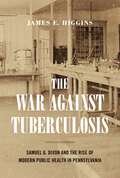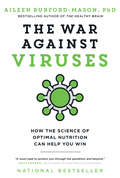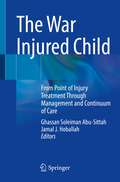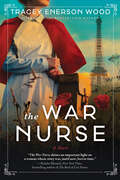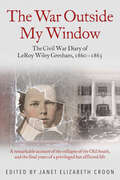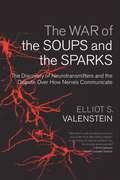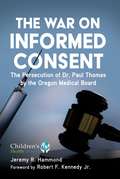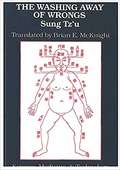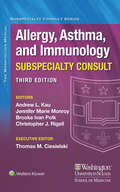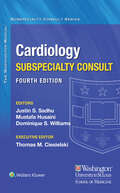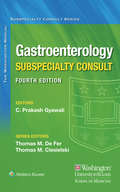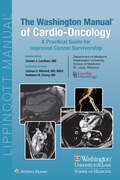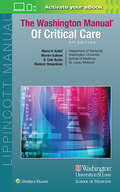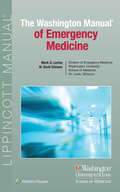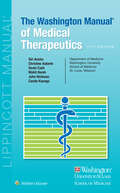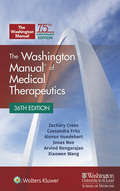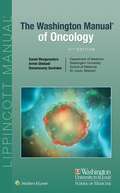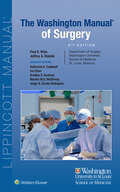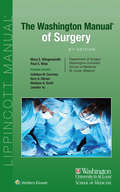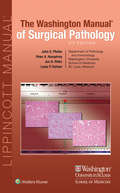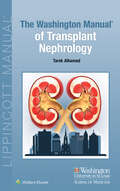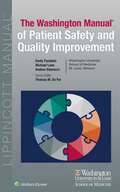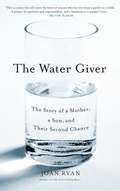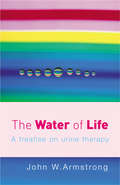- Table View
- List View
The War Against Tuberculosis: Samuel G. Dixon and the Rise of Modern Public Health in Pennsylvania (Keystone Books)
by James E. HigginsIn 1905, sanitary conditions in Pennsylvania were appalling. Thousands of children died of preventable and curable diseases, tens of thousands in the coal regions hacked themselves to death from black lung disease, and pollution in the commonwealth’s water killed tens of thousands more. In the wake of an alarming typhoid outbreak in Butler, the Pennsylvania legislature formed a modern state department of health. At its head was Samuel G. Dixon, who would rise to fame as one of the most respected public health experts of his day.While the legislation that created Pennsylvania’s department of health cleared space for its aggressive action, it was Dixon’s deft political touch and keen insight that enabled the department to avoid destruction at the hands of a people notoriously hostile to government encroachment. As commissioner, Dixon constructed the world’s largest, most sophisticated system of tuberculosis controls, with thousands of beds in three great sanatoria. As his reputation grew, Dixon was recognized as one of the nation’s greatest public health reformers and a champion of technology as the answer to great societal problems. At the same time, Dixon was a eugenicist who helped author a marriage law prohibiting unions between the diseased, those with intellectual disabilities or psychiatric disorders, alcoholics, and the “unfit.”This compelling history of Pennsylvania’s first commissioner of public health provides a fascinating view into the changes wrought by germ theory and the public health efforts that stemmed from it during the Progressive Era in the United States.
The War Against Viruses: How the Science of Optimal Nutrition Can Help You Win
by Aileen Burford-MasonIn March 2020, the World Health Organization designated the viral disease COVID-19 a pandemic. Dr. Aileen Burford-Mason’s new book, The War Against Viruses, explains how we can help reduce the risk and severity of COVID-19 infection. But it goes beyond this, showing how staying well in general, and avoiding winter colds and flus in particular, is possible with optimal nutrition. When operating efficiently, the immune system represents biological teamwork at its best: a symphony of protective cells and biomolecules acting together to rapidly recognize potentially harmful microbes and eliminate them. The orchestration of this complex system depends on a continuous and ample supply of essential components—vitamins, minerals, beneficial fats and other nutrients—to function properly. But a growing body of research shows that the nutritional content of our food has sharply declined over the course of the last century. As the use of high-yield industrial farming practices has increased, so the nutritional content has decreased. The War Against Viruses shows how without a rounded intake of essential nutrients our immune response may be compromised, especially during emergencies. The book provides evidence-based advice on how to recognize gaps in our nutritional arsenal. Dr. Burford-Mason creates a personal supplement regime that can overcome potential dietary shortfalls by strengthening our immune response to infection, thus helping to reduce the potential for lethal illness.
The War Injured Child: From Point of Injury Treatment Through Management and Continuum of Care
by Jamal J. Hoballah Ghassan Soleiman Abu-SittahAround 1 in 6 of the world’s children live in a conflict zone, and of these 357 million children, 165 million are affected by high intensity conflicts. Pediatric war injuries pose a huge challenge to health professionals treating such patients. The evidence base on the quality and scale of this challenge is scarce, and the majority of clinicians treating these patients are either not sufficiently experienced in the treatment of war injuries, are not pediatric surgeons, or both. The majority of the evidence in the literature comes from a small subset of children who were managed in well-resourced military facilities that differ drastically from the conditions in which the majority of war wounded children are treated.This book - the first of its kind - is a comprehensive and state-of-the art guide for both local and humanitarian non-pediatric specialists who are often forced to operate on and treat children with war injuries with little or no previous experience or training. It provides healthcare workers in conflict settings with knowledge and practical advice on the entire continuum of care, from point of injury, to treatment and reconstruction, to rehabilitation and mental health support. It is comprised of concise yet comprehensive overviews of the current status of the pediatric war casualty patient treatment and will help guide patient management based on evidence from the literature, clinical and surgical experience and ongoing research and will stimulate investigative efforts in this dynamic and active field of war medicine. The book draws on the knowledge and long experience of clinicians at the American University of Beirut Medical Center, one of the largest tertiary care and referral centers in the Middle East, which has been the foremost civilian academic hospital treating war injuries, both adult and pediatric, initially from the Lebanese war and then the Iraqi and Syrian wars.
The War Nurse: A Novel
by Tracey Enerson Wood"Any readers who enjoyed the mix of romance, intrigue, and medical accuracy of Call the Midwife will love The War Nurse."—New York Journal of Books"[An] impeccably researched, well-drawn, based-on-a-true-story tale, written by a former RN...The War Nurse shines an important light on a woman whose story was, until now, lost to time."—Kristin Harmel, New York Times bestselling author of The Book of Lost NamesBased on a true story, The War Nurse is a sweeping historical novel by USA Today bestselling author Tracey Enerson Wood that takes readers on an unforgettable journey through WWI France.She asked dozens of young women to lay their lives on the line during the Great War. Can she protect them?Superintendent of Nurses Julia Stimson must recruit sixty-four nurses to relieve the battle-worn British, months before American troops are ready to be deployed. She knows that the young nurses serving near the front lines will face a challenging situation, but nothing could have prepared her for the chaos that awaits when they arrive at British Base Hospital 12 in Rouen, France. The primitive conditions, a convoluted, ineffective system, and horrific battle wounds are enough to discourage the most hardened nurses, and Julia can do nothing but lead by example—even as the military doctors undermine her authority and make her question her very place in the hospital tent.When trainloads of soldiers stricken by a mysterious respiratory illness arrive one after the other, overwhelming the hospital's limited resources, and threatening the health of her staff, Julia faces an unthinkable choice—to step outside the bounds of her profession and risk the career she has fought so hard for, or to watch the people she cares for most die in her arms.Fans of Martha Hall Kelly's Lost Roses and Marie Benedict's Lady Clementine will devour this mesmerizing celebration of some of the most overlooked heroes in history: the fierce, determined, and brave nurses who treated soldiers in World War I.Praise for The War Nurse:"Through careful research, this book shows the incredible bravery and compassion of women who find themselves in extraordinary situations."—Julia Kelly, international bestselling author of The Last Garden in England and The Light Over London"A rich, gripping history of one woman's lifelong battle against systemic prejudice."—Stewart O'Nan, award-winning author of The Good Wife"Once again, Tracey Enerson Wood, with her impeccable research and evocative prose, kept me glued to the page. Wood has a talent for bringing strong, yet lesser-known women from history, to life."—Linda Rosen, author of The Disharmony of Silence"A riveting and surprisingly timely story of courage, sacrifice, and friendship forged at the front lines."—Kelly Mustian, author of The Girls in the Stilt House"If you, like me, are a voyeur of historical drama that unfolds as if the kitchen window flew open and the characters were caught in action, then The War Nurse is for you."—Diane Dewey, author of Fixing the Fates"Fans of Patricia Harman will love Wood's treatment of medical expertise in a historical setting."—Booklist
The War Outside My Window: The Civil War Diary of LeRoy Wiley Gresham, 1860-1865
by Janet Elizabeth CroonA remarkable account of the collapse of the Old South and the final years of a young boy’s privileged but afflicted life.LeRoy Wiley Gresham was born in 1847 to an affluent slave-holding family in Macon, Georgia. After a horrific leg injury left him an invalid, the educated, inquisitive, perceptive, and exceptionally witty twelve-year-old began keeping a diary in 1860—just as secession and the Civil War began tearing the country and his world apart. He continued to write even as his health deteriorated until both the war and his life ended in 1865. His unique manuscript of the demise of the Old South is published here for the first time in The War Outside My Window.LeRoy read books, devoured newspapers and magazines, listened to gossip, and discussed and debated important social and military issues with his parents and others. He wrote daily for five years, putting pen to paper with a vim and tongue-in-cheek vigor that impresses even now, more than 150 years later. His practical, philosophical, and occasionally Twain-like hilarious observations cover politics and the secession movement, the long and increasingly destructive Civil War, family pets, a wide variety of hobbies and interests, and what life was like at the center of a socially prominent wealthy family in the important Confederate manufacturing center of Macon. The young scribe often voiced concern about the family’s pair of plantations outside town, and recorded his interactions and relationships with servants as he pondered the fate of human bondage and his family’s declining fortunes.Unbeknownst to LeRoy, he was chronicling his own slow and painful descent toward death in tandem with the demise of the Southern Confederacy. He recorded—often in horrific detail—an increasingly painful and debilitating disease that robbed him of his childhood. The teenager’s declining health is a consistent thread coursing through his fascinating journals. “I feel more discouraged [and] less hopeful about getting well than I ever did before,” he wrote on March 17, 1863. “I am weaker and more helpless than I ever was.” Morphine and a score of other “remedies” did little to ease his suffering. Abscesses developed; nagging coughs and pain consumed him. Alternating between bouts of euphoria and despondency, he often wrote, “Saw off my leg.”The War Outside My Window, edited and annotated by Janet Croon with helpful footnotes and a detailed family biographical chart, captures the spirit and the character of a young privileged white teenager witnessing the demise of his world even as his own body slowly failed him. Just as Anne Frank has come down to us as the adolescent voice of World War II, LeRoy Gresham will now be remembered as the young voice of the Civil War South.Winner, 2018, The Douglas Southall Freeman Award
The War of the Soups and the Sparks: The Discovery of Neurotransmitters and the Dispute Over How Nerves Communicate
by Valenstein Elliot S.The War of the Soups and the Sparks tells the engaging story of the dispute between the pharmacologists who uncovered the first evidence that nerves communicate by releasing chemicals and the neurophysiologists who dismissed the proof and remained committed to electrical explanations. At the center of the story are the neuroscientist Otto Loewi and the pharmacologist Henry Dale, who received Nobel Prizes for their work, and the physiologist Walter Cannon, who would have shared the prize if he had not been persuaded to adopt a controversial theory. Expertly researched and recounted, The War of the Soups and the Sparks is the absorbing and enlightening tale of an immensely consequential scientific discovery.
The War on Informed Consent: The Persecution of Dr. Paul Thomas by the Oregon Medical Board (Children’s Health Defense)
by Jeremy R. HammondTo preserve public vaccine policy, Dr. Paul Thomas was disbarred and discredited—discover how he was punished for pursuing the truth for his patients. On December 3, 2020, the Oregon Medical Board issued an emergency order to suspend the license of renowned physician Paul Thomas, MD. The ostensible reason was that Dr. Thomas posed a threat to public health by failing to vaccinate his pediatric patients according to the CDC&’s schedule. However, the order came just days after Thomas published a peer-reviewed study indicating that his unvaccinated patients were the healthiest children in his practice. The medical board ignored this data despite having requested Thomas to produce peer-reviewed evidence to support his alternative approach. &“Dr. Paul&” started out practicing medicine the way he was trained to, which meant vaccinating according to the CDC&’s routine childhood vaccine schedule. But then he went on a journey of awakening, becoming what he calls &“vaccine risk aware,&” and arrived at a place where no longer in good conscience could he continue &“business as usual&” with this one-size-fits-all approach. He left a private group practice to open his own clinic with the foundational principles of individualized care and respect for the right to informed consent. He wrote the Vaccine-Friendly Plan with Jennifer Margulis, PhD, to help parents navigate the decision-making process. Then the accusations from the medical board started coming. The War on Informed Consent exposes how the medical board suspended Dr. Thomas&’s license on false pretexts, illuminating how the true reason for the order was that, by practicing informed consent, he posed a threat to public vaccine policy, which is itself the true threat to public health.
The Washing Away of Wrongs: Forensic Medicine in Thirteenth-Century China (Science, Medicine, and Technology in East Asia #1)
by Sung Tz'U Brian E. McKnightT'zu's The Washing Away of Wrongs (Hsi yüan chi lu), printed in 1247, is the oldest extant book on forensic medicine in the world. Written as a guide for magistrates in conducting inquests, the book is a major source on early Chinese knowledge of pathology and morbid anatomy. Includes a lengthy introductory essay by the translator.
The Washington Manual Allergy, Asthma, and Immunology Subspecialty Consult
by Andrew Kau Jennifer Marie Monroy Brooke Ivan Polk Christopher J. RigellConcise, portable, and user-friendly, The Washington Manual® Allergy, Asthma, and Immunology Subspecialty Consult, Third Edition, provides essential information on inpatient and outpatient management of allergy, asthma, and immunologic disorders. This edition offers practical guidance on diagnosis, investigation, and treatment, including state-of-the-art content on biomedical discoveries and novel therapeutics. Ideal for residents, fellows, and practicing physicians who need quick access to current scientific and clinical information in this fast-changing area, the manual is also useful as a first-line resource for internists and other primary care providers.
The Washington Manual Cardiology Subspecialty Consult
by Justin Sadhu Mustafa Husaini Dominique WilliamsConcise, portable, and user-friendly, The Washington Manual® Cardiology Subspecialty Consult, Fourth Edition, provides essential information on inpatient and outpatient management of common diseases and disorders. Edited by Drs. Justin S. Sadhu, Mustafa Husaini, and Dominique S. Williams, this edition offers state-of-the-art content on disease pathophysiology, diagnostic tools, and management options, including new biomedical discoveries and novel therapeutics. Ideal for residents, fellows, and practicing physicians who need quick access to current scientific and clinical information in cardiology, the manual is also useful as a first-line resource for internists and other primary care providers.
The Washington Manual Gastroenterology Subspecialty Consult
by Chandra GyawaliConcise, portable, and user-friendly, The Washington Manual® Gastroenterology Subspecialty Consult, Fourth Edition, provides essential information on inpatient and outpatient management of common gastrointestinal diseases and disorders. This edition offers state-of-the-art content on disease pathophysiology, diagnostic tools, and management options. Ideal for residents, fellows, and practicing physicians who need quick access to current scientific and clinical information in gastroenterology, the manual is also useful as a first-line resource for internists and other primary care providers. The Washington Manual® is a registered mark belonging to Washington University in St. Louis to which international legal protection applies. The mark is used in this publication by Wolters Kluwer Health under license from Washington University.
The Washington Manual of Cardio-Oncology: A Practical Guide for Improved Cancer Survivorship
by Joshua Mitchell Daniel J Lenihan Kathleen ZhangWritten by experts in cardiovascular disease, hematology, and oncology, The Washington Manual® of Cardio-Oncology: A Practical Guide for Improved Cancer Survivorship is a clinically relevant, easy-to-use primer on the detection, management, and improved cardiovascular-based patient outcomes in adults undergoing treatment for cancer or who have previously survived cancer therapy. Edited by Drs. Daniel J. Lenihan, Joshua D. Mitchell, and Kathleen W. Zhang, this concise yet comprehensive manual provides high-yield information that reflects today’s advances in risk stratification, early diagnosis, and treatment of cardiovascular disease—all in an easy-access, concisely bulleted format for on-the-go reference.
The Washington Manual of Critical Care
by Marin KollefThe Washington Manual of Critical Care, similar to other volumes in this vaunted series, features authors and contributors who are faculty members and practicing physicians at Washington University’s School of Medicine. Inside you’ll find comprehensive and current information for bedside diagnosis and management of some of the most common illnesses and problems encountered in the ICU setting.
The Washington Manual of Emergency Medicine
by Mark D. LevineEach high-quality volume in the esteemed Washington Manual series brings together contributions from faculty and residents at the Washington University School of Medicine in St. Louis. The Washington Manual of Emergency Medicine, the latest addition to the series, focuses on practical content on how physicians actually practice emergency care. Comprehensive and concise, it also acts as a handy quick-reference, delivering need-to-know information at your fingertips, even in point-of-care situations.
The Washington Manual of Medical Therapeutics
by Siri Ancha Christine Auberle Cash Devin Mohit HarshThe Washington Manual® of Medical Therapeutics, 37th Edition, provides essential information you need for successful patient care, with concise, high-yield content that reflects today’s fast-changing advances in medical technology and therapeutics. Written by faculty, residents, and fellows and edited by chief residents of the distinguished Washington University School of Medicine in St. Louis, the Washington Manual presents brief, logical approaches to diagnosis and management of commonly encountered medical conditions, including new therapies that improve patient outcomes. Discover why housestaff and faculty around the world depend on this best-selling resource for day-to-day clinical practice in internal medicine.
The Washington Manual of Medical Therapeutics Paperback
by Zachary Crees Cassandra Fritz Alonso Huedebert Jonas Noe Arvind Rengarajan Xiaowen WangEstablished for more than 75 years, The Washington Manual of Medical Therapeutics, 36th Edition , provides concise, high-yield content that reflects today’s fast-changing advances in medical technology and therapeutics. In one convenient, portable resource, you’ll find complete coverage of every area of medicine and the core subspecialties—all at your fingertips for quick review and reference. Discover why housestaff and faculty worldwide depend on this best-selling resource for day-to-day clinical practice in internal medicine.
The Washington Manual of Oncology: Therapeutic Principles in Practice (Spiral Manual Ser.)
by Ramaswamy Govindan Daniel MorgenszternFocusing on the essential information you need to know for the clinical practice of oncology, this practical volume in the Lippincott Manual series provides concise, high-yield content that reflects today’s fast-changing advances in the field. In one convenient, portable resource, you’ll find complete coverage of cancer management, all at your fingertips for quick review and reference. The Washington Manual® of Oncology, 4th Edition, is an ideal reference for oncologists, residents, fellows, medical students, nurse practitioners, and physician assistants.
The Washington Manual of Outpatient Internal Medicine
by Maureen Lyons Peter McDonnell Jennifer SchmidtFocusing on the essential information you need to know for the most commonly encountered problems in outpatient internal medicine, this practical volume in the Washington Manual® series provides concise, high-yield content that reflects today’s advances in patient evaluation and management. In one convenient, portable resource, you’ll find complete coverage of everything from hypertension and diabetes to sleep disorders, nutrition, and care of the cancer patient—all at your fingertips for quick review and reference. Edited by Drs. Maureen D. Lyons, Peter J. McDonnell, and Jennifer M. Schmidt, The Washington Manual® of Outpatient Internal Medicine, 3rd Edition, is an excellent companion to the Washington Manual® of Medical Therapeutics, which thoroughly covers inpatient care.
The Washington Manual of Surgery
by Jeffrey A. Blatnik Paul E. WiseFocusing on must-know information in the broad spectrum of general surgery, The Washington Manual® of Surgery, 9th Edition, provides concise, high-yield content essential for surgical residents, attendings, medical students, and others who provide care for patients with surgical disease. Edited by Drs. Paul E. Wise and Jeffrey A. Blatnik, and written by teams of Washington University residents and faculty, this bestselling manual presents state-of-the-art, comprehensive information in a brief, outline format, along with numerous figures, tables, algorithms, and images throughout. In one convenient, portable resource, you’ll find practical coverage of all surgical subspecialties (thoracic, GI, colorectal, cardiac, vascular, breast, trauma, critical care, and more)—all at your fingertips for quick review and reference.
The Washington Manual of Surgery: Department Of Surgery, Washington University School Of Medicine, St. Louis, Missouri (Spiral Manuals)
by Mary E. KlingensmithWritten by teams of Washington University residents and faculty, The Washington Manual® of Surgery, 8th Edition, focuses on the essential information you need to know, providing concise, high-yield content that covers the broad spectrum of patient care in general surgery. In one convenient, portable resource, you’ll find practical information on all surgical subspecialties (thoracic, GI, colorectal, cardiac, vascular, breast, trauma, critical care, and more)—all at your fingertips for quick review and reference. This bestselling manual is an excellent source of expert guidance for surgical residents, attendings, medical students, and others who provide care for patients with surgical disease.
The Washington Manual of Surgical Pathology: Department Of Pathology And Immunology, Washington University School Of Medicine, St. Louis, Missouri (Spiral Manual Ser.)
by John D. Pfeifer Louis P. Dehner Peter A. HumphreyFocusing on the essential information you need to know for the clinical practice of surgical pathology, this award-winning volume in the Lippincott Manual series provides concise, high-yield content that reflects today’s fast-changing advances in the field. In one convenient, portable resource, you’ll find complete coverage of surgical pathology for every organ and anatomic site —all at your fingertips for quick review and reference. Washington Manual of Surgical Pathology, 3rd Edition, is an ideal reference for surgical pathologists at all levels of training and practice.
The Washington Manual of Transplant Nephrology
by Tarek AlhamadFocusing on the essential information you need to know for successful patient care, The Washington Manual® of Transplant Nephrology provides concise, high-yield content essential for nephrology fellows, transplant trainees, and practitioners, as well as for the entire team involved in pre- and post-transplant care. Edited by Dr. Tarek Alhamad, lead editor of The Washington Manual Nephrology Subspecialty Consult, it presents state-of-the-art, comprehensive information in a brief, bulleted format, along with numerous figures, tables, algorithms, and images throughout.
The Washington Manual® of Patient Safety and Quality Improvement
by Md Andrea Vannucci Michael Lane Emily Fondahn Mphs DeaaConcise, portable, and user-friendly, The Washington Manual® of Patient Safety and Quality Improvement covers essential information in every area of this complex field. With a focus on improving systems and processes, preventing errors, and promoting transparency, this practical reference provides an overview of PS/QI fundamentals, as well as insight into how these principles apply to a variety of clinical settings. Part of the popular Washington Manual® series, this unique volume provides the knowledge and skills necessary for an effective, proactive approach to patient safety and quality improvement.
The Water Giver: The Story of a Mother, a Son, and Their Second Chance
by Joan RyanBoth a medical drama and meditation on motherhood, The Water Giver is Joan Ryan's honest account of her doubts and mistakes in raising a learning-disabled son and the story of how his near-fatal accident gave her a second chance as a parent. Joan Ryan tells the powerful story of how her son&’s near-fatal accident, and his struggle to become whole again, gave her a second chance to become the mother she had always wished she could be. • Acclaimed journalist and author: Joan Ryan&’s sports columns earned her thirteen Associated Press Sports editors Awards, the National Headliner Award, and the Women&’s Sports Foundation&’s Journalism Award, among other honors. Her first book, Little Girls in Pretty Boxes: The Making and Breaking of Elite Gymnasts and Figure Skaters was named one of the Top 100 Sports Books of all Time by Sports Illustrated. • Medical drama: When Ryan&’s sixteen-year-old son fell off of a skateboard, it wasn&’t obvious at first how serious his injuries were. With a journalist&’s eye for the telling detail and the rhythms of a natural storyteller, she captures his medical ordeal as he lurches from crisis to crisis—and with harrowing honesty and astonishing insight, relates her own journey through unknown emotional terrain. • A mother&’s story: Ryan&’s son was diagnosed with Sensory Integration Dysfunction as a toddler; by the time he reached school age, it was clear that he suffered from ADHD and other learning disabilities. Though she loved him fiercely, she never stopped trying to fix him. When he is restored to her after his accident, she realizes she has the opportunity to be his mother all over again—only this time she lets go of the illusion of control. Now she not only accepts, but also embraces her son for who he really is.
The Water Of Life: A Treatise on Urine Therapy
by John W ArmstrongIn this revolutionary treatise, J W Armstrong puts the compelling case that all diseases (except those caused by traumatism or structural disorders) can be cured by one simple means: urine therapy. The therapy is an entirely natural treatment, a drugless system of healing that treats the body as a whole. Moreover, the only ingredient needed is a substance manufactured in the body itself, rich in mineral salts, hormones and other vital substances, namely human urine. It may seem strange to take back into the body something that the body is apparently discarding. Yet the theory is similar to the natural practice of organic composting. Fallen leaves, when dug back into the soil, provide valuable mineral salts to nourish new plant life. The same principle holds true for the human body.
